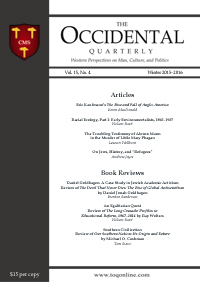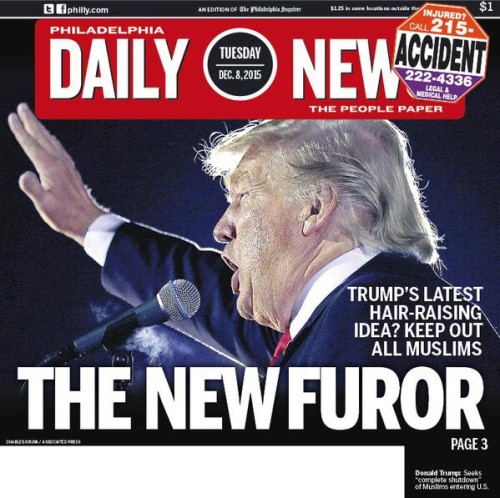A Haaretz columnist, Chemi Shalev, complains that Jewish organizations have not been up in arms about Donald Trump’s proposed immigration policy. The reason Jewish organizations must act is because over 90 years ago the US passed an immigration restriction bill that shut off the flow of Eastern European Jews to America.
The basic logic here is that the 1924 Immigration Restriction Act was the Original Sin of White America. The attempt on the part of Americans to fashion their immigration policy to retain an ethnic status quo as of 1890 was so horrifically evil that Jewish organizations have a duty to once again bring all the pressure they can muster to allow in every last immigrant who wants to come to America. Needless to say, Israel’s immigration policy — clearly engineered to retain Jewish ethnic dominance — is not at issue for Shalev.
I won’t dispute Shalev’s point that the main concern of White America in 1924 was the influx of Jews, but of course he fails to contextualize this concern properly. As I noted elsewhere, there was an
explicit concern about lack of assimilability. Although the bias toward Northern Europeans did indeed discriminate against Southern and Eastern Europeans, it was obvious from the debates that the main concern was Eastern European Jewish immigrants, large percentages of whom were radicals (see here, p. 271 ff) and none of whom identified with the people or culture of Christian, Northern European America. Support for immigration restriction was centered in rural America, particularly in the South and West; as John Higham noted, “Jews, as a result of their intellectual energy and economic resources, constituted an advance guard of the new peoples who had no feeling for the traditions of rural America” (Send These to Me: Immigrants in Urban America, rev. ed. Baltimore: Johns Hopkins University Press, 1984, 168–169). Lack of rapport with the traditional people and culture of America was apparent among the New York Intellectuals and among Jewish radicals who were entirely mainstream in the Jewish community. In the immigration debates of 1924 Representative Knud Wefald of Minnesota emphasized lack of sympathy with traditional American culture:
I for one am not afraid of the radical ideas that some might bring with them. Ideas you cannot keep out anyway, but the leadership of our intellectual life in many of its phases has come into the hands of these clever newcomers who have no sympathy with our old-time American ideals nor with those of northern Europe, who detect our weaknesses and pander to them and get wealthy through the disservices they render us.
Our whole system of amusements has been taken over by men who came here on the crest of the south and east European immigration. They produce our horrible film stories, they compose and dish out to us our jazz music, they write many of the books we read, and edit our magazines and newspapers. (Cong. Rec., April 12, 1924, 6272)
Thus a main concern in addition to the very large numbers of radicals among Jewish immigrants and the fact that sympathy for the far left was entirely mainstream within the Jewish community, was that Jews were fast becoming an intellectual elite with very different attitudes than the traditional people of America. These concerns are more than justified given the subsequent history of the US, and particularly US immigration policy where Jewish organizations led the campaign culminating in the 1965 immigration law that ended the ethnic status quo legislated by the 1924 law and opened up immigration to all the peoples of the world.
Unlike the 1924 law, the 1965 immigration law was not at all in response to public outcry but to prolonged pressure that was organized, funded and led by the organized Jewish community; it also occurred in the context of the ascendancy of Jewish-dominated intellectual movements that undercut the intellectual basis for immigration restriction rooted in the legitimate ethnic interests of the traditional people of America (see here, passim).
Since 1965, the mainstream Jewish community has strongly supported increasing the numbers of immigrants, as for example in their support of the Schumer-Rubio immigration amnesty/surge immigration bill in 2013. During the public debate, Jewish organizations once again flogged the 1924 law as the epitome of evil.
The immigration policy advocated by Jewish organizations for the US has always had two main components:
- Maximize the total number of immigrants; in the immediate aftermath of the passage of the 1965 law that removed the bias toward Western Europe, Jewish immigration activists switched to focus on maximizing total numbers. (See here, p. 291)
- Promote the idea that immigrants not be chosen for their ability to make an economic contribution to the U.S. The assumption is that, apart from those who are “dangerous or a threat to national security,” all immigrants in whatever numbers have a positive impact on the society as a whole (see previous link, p. 277-278). Family reunification, which has been a bedrock Jewish attitude at least since the 1940s (see previous link, p. 277-278), is the basis of chain migration which has been one of themain reasons why numbers of immigrants has skyrocketed.
So that leaves us with Shalev’s concerns about the relative silence of Jewish organizations:
The U.S. might desperately need immigration reform but that does not excuse the deathly Jewish silence on Trump’s outrageous statements. … If one wants to be generous, one can ascribe the American Jewish muteness to other preoccupations, ranging from summer vacations to arguments over the Iran deal. Perhaps, like some Republican presidential hopefuls, they are simply afraid of the kind of verbal retribution that Trump might unleash if he is criticized. Others still might be motivated by the kind of deep seated hatred of Obama that has caused many Jews to hear, see or speak no evil of any of his potential adversaries.
The most disconcerting possibility, however, is that Jews are losing their historical support for immigration as a defining value of the American ethos; that they are no longer moved by the plea “Give me your tired, your poor, your huddled masses yearning to breathe free, The wretched refuse of your teeming shore,” written by Emma Lazarus and engraved on the Statue of Liberty.
I rather doubt the latter reason is at all likely, and I won’t comment further on the glaring intellectual blind spot shown by Shalev where it’s morally okay for his people to have an ethnostate but anathema for European Americans.
However, it is interesting that Jewish organizations have remained relatively silent. As noted regarding the 2013 immigration debates, Jewish organizations were not at all shy about advocating the immigration amnesty/surge bill, finding their rationale in a supposed uniquely Jewish morality while making moral condemnations of its opponents.
It makes sense to suppose that since Jewish organizations are very publicly opposing Obama’s Iran deal, it might seem poor strategy to have Jewish organizations taking sides against Trump. One issue at a time. Also, there may well be a strand of Jewish thinking that any Republican would be relatively good for Israel given the unanimity of Republican opposition to the Iran deal. Still, I really can’t believe that Jewish activists would be bothered by a second Clinton presidency given her support among fanatical Zionists like Haim Saban and her coterie of neocon foreign policy people.
Further, the immigration debate will be with us long after the vote on the Iran deal in September. Plenty enough time to pull out all the heavy artillery for the 2016 election. After all, lots of pundits are still predicting that Trump will be forgotten as a candidate in a few months. And from their point of view, the nomination and then resounding, often-predicted defeat of a Republican populist candidate would be cause for great rejoicing—a resounding defeat for the traditional people and culture of America.
Also, Trump’s policy statement has been roundly criticized in the mainstream media which has long reflected the views on immigration of the organized Jewish community. Here it would be silly not to mention Jews as media owners, media producers, and as able to expunge voices that violate the current racial zeitgeist (see here and here).
In a real sense, much of the mainstream media functions as a proxy for the views of the organized Jewish community; proxies have a similar effect but have the advantage of not calling attention to Jewish identities and interests. As Patrick Cleburne notes in a comment on the thousands that are expected to turn out for a Donald Trump rally in Mobile, Alabama:
A couple more events like Mobile looks like being and we are going to be deluged with Nuremberg rally comparisons. No one who can stir up the Serfs like this is going to be trusted.
Implicit in this statement is that Jewish concerns about White people turning into Nazis dominate the mainstream media. And although the media’s comparisons will be with Nazi rallies, it will be their proxies in the media making the comparisons, not Jewish organizations — at least for the time being.
This calls attention to the fact that Jewish organizations would do well not to take a public stance on Trump simply because he has touched a public nerve. It’s one thing to ruin careers of people with relatively little power, but certainly Trump is not so easily dealt with given his celebrity status, his wealth, and what increasingly seems to be his political deftness. The weakness of Jewish power is that, despite Jewish influence on the media, it has typically opposed strong trends in traditional American culture (public presence of Christianity, gun control, the public culture of homosexuality) that remain popular with substantial percentages of the public despite Jewish media influence.
This is also true of immigration. Despite the tsunami of positive messages on immigration emanating from the mainstream media, Trump’s policies on immigration are clearly in sync with the views of most Americans. Jewish attitudes on immigration are certainly not deeply rooted in popular attitudes among White Americans. The anti-White revolution has been a top-down phenomenon which has occurred because fundamentally America is now an oligarchy, not a democracy. Trump’s populist appeal is a real threat to our new, hostile elite because it is fundamentally uncontrollable.
In addition, it is quite possible that another reason for the relative silence is that the aura of Jewish moral superiority that has been so important for Jewish success has been slipping noticeably lately. This has occurred particularly on the left with the success of the BDS movement because of the behavior of Israel toward the Palestinians, and anyone who is remotely familiar with Israel is quite aware of Jewish double standards and hypocrisy on immigration as a moral imperative.
The loss of the Jewish image of victimhood and moral superiority would indeed be a very large step in the right direction. If and when Jewish organizations feel that it would be counterproductive to issue statements supporting immigration, it would be a great sign that things really are changing. I rather doubt that we are there yet, but their aura of moral superiority has never been so vulnerable.






